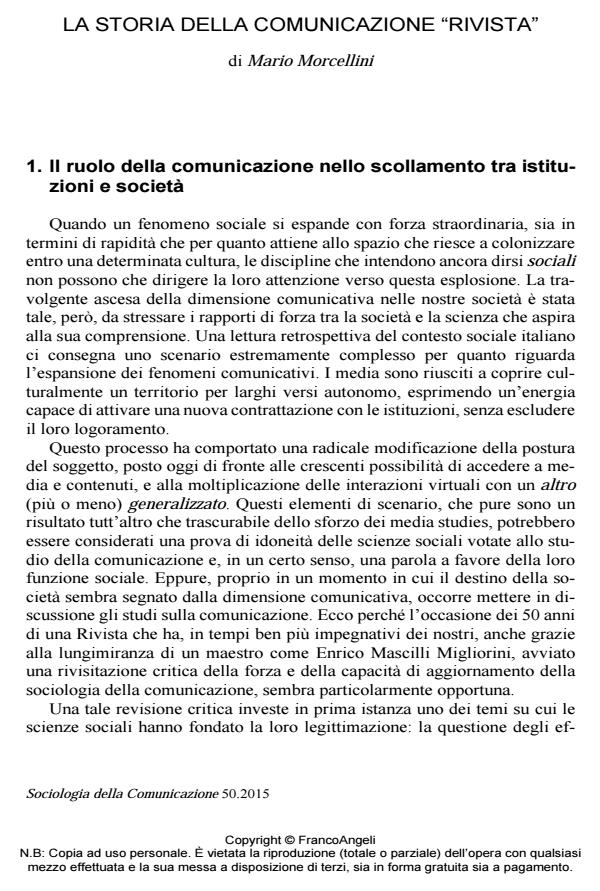Reconsidering the history of communication sciences
Journal title SOCIOLOGIA DELLA COMUNICAZIONE
Author/s Mario Morcellini
Publishing Year 2016 Issue 2015/50
Language Italian Pages 11 P. 32-42 File size 199 KB
DOI 10.3280/SC2015-050003
DOI is like a bar code for intellectual property: to have more infomation
click here
Below, you can see the article first page
If you want to buy this article in PDF format, you can do it, following the instructions to buy download credits

FrancoAngeli is member of Publishers International Linking Association, Inc (PILA), a not-for-profit association which run the CrossRef service enabling links to and from online scholarly content.
The paper analyzes some recent developments regarding communication phenomena and asks for a deep critical rethinking in the field of media studies. The unexpected and surely unforeseen communication development has decisively affected societal norms and behaviors, thus provoking a sort of shock in contemporary societies. Communication scholars have shown a severe lack of preparation towards these social changes. In a wider sense, Sociology as a discipline risks to be marginalized by communication, thus loosing her own social reputation.
Keywords: Sociology of communication, media studies, communication effects, socialization, digital technologies, participation
- Beck U. (1986), Risikogesellschaft. Auf dem Weg in eine andere Moderne, Suhurkamp, Verlag; trad. it. La società del rischio. Verso una seconda modernità, Carocci, Roma 2000
- D’Egidio F. (2002), Il bilancio dell’intangibile, FrancoAngeli, Milano. Donolo C. (2011), Italia sperduta. La sindrome del declino e le chiavi per uscirne, Donzelli, Roma.
- Gallino L. (2007), Il lavoro non è una merce, Laterza, Roma-Bari.
- Giddens A. (1990), The Consequences of Modernity, Polity Press, Cambridge; trad. it. (1994), Le conseguenze della modernità Fiducia e rischio, sicurezza e pericolo, il Mulino, Bologna.
- Jenkins H., Purushotma R., Clinton, K., Wiegel M., Robison, A. J., (2009), Confronting the challenges of participatory culture: Media education for the 21st century, Mac Arthur Foundation.
- Losito G. (2014), La crisi, il degrado sociale e culturale e il potere dei media, «Paradoxa », 2.
- Mascheroni G. (a cura di) (2012), I ragazzi e la rete. La ricerca EU Kids Online e il caso Italia, La Scuola, Brescia.
- McAdam D. (1982) Political Process and the Development of Black Insurgency, 1930-1970, University of Chicago Press, Chicago.
- Morcellini M. (a cura di) (2005), Il Mediaevo italiano. Industria culturale, TV e tecnologie tra XX e XXI secolo, Carocci, Roma.
- Morcellini M., Mazza B. (2008), a cura, Oltre l'individualismo. Comunicazione, nuovi diritti e capitale sociale, FrancoAngeli, Milano
- Morcellini M. (2013), Comunicazione e media, Egea, Milano.
- Morcellini, M. (2014) Lo spread tra comunicazione e società. Tesi per una riflessione critica sui guasti della comunicazione, per il numero monografico I guasti della comunicazione, «Paradoxa», anno VIII, n. 2, aprile/giugno.
- Piselli F. (2001), Capitale sociale: un concetto situazionale e dinamico, in Bagnasco A., Piselli F., Pizzorno A., Trigilia C., Il capitale sociale – Istruzioni per l’uso, il Mulino, Bologna.
- Sciolla L. (2000), Coesione sociale, cultura civica, società complesse, «il Mulino», 1.
- Taitte W.L., Witte Jr. J., Loury G.C., Jenning B., Ciulla J.B. (eds.) (1997), Moral Values. The Challenge of the Twenty-First Century, University of Texas Press, Austin.
- Thompson J. (1995), The Media and Modernity. A Social Theory of the Media, Stanford University Press, Stanford; trad. it. (1998) Mezzi di comunicazione e modernità. Una teoria sociale dei media, il Mulino, Bologna.
- Warschauer M. (2003), Technology and social inclusion: Rethinking the digital divide, MIT Press, Cambridge.
Mario Morcellini, La storia della comunicazione "rivista" in "SOCIOLOGIA DELLA COMUNICAZIONE " 50/2015, pp 32-42, DOI: 10.3280/SC2015-050003